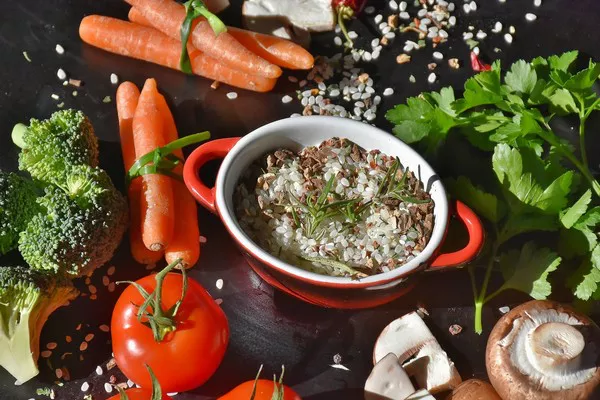Achieving muscle gain requires a well-balanced combination of exercise, nutrition, and rest. Among these factors, protein intake plays a crucial role in supporting muscle growth and repair. Understanding the optimal amount of protein required for muscle gain is essential for individuals looking to maximize their muscle-building potential. In this comprehensive guide, we will explore the science behind protein and muscle gain, factors affecting protein needs, and the role of protein timing and sources in optimizing muscle growth.
The Importance of Protein in Muscle Gain
Proteins are the building blocks of muscles, composed of amino acids that support muscle tissue repair and growth. During resistance training, muscles undergo stress and micro-tears, and adequate protein intake aids in repairing these damaged fibers and promoting hypertrophy. Moreover, protein is involved in various enzymatic processes that influence muscle metabolism.
SEE ALSO: Protein Synthesis: Factors that Promote Muscle Growth
Calculating Protein Requirements for Muscle Gain
There are several approaches to calculate the protein need to gain muscle:
1. Body Weight-Based Approach
One common method to determine protein needs for muscle gain is by calculating based on body weight. The general recommendation for individuals engaging in regular resistance training is to consume 1.2 to 2.2 grams of protein per kilogram of body weight. For example, a 70 kg individual would need to consume between 84 to 154 grams of protein daily.
2. Lean Body Mass Approach
Another approach takes into account the lean body mass (LBM), as it better reflects the amount of metabolically active tissue. To calculate protein needs using LBM, one should first measure their body fat percentage and subtract it from their total weight. The resulting lean body mass is then multiplied by a factor of 1.4 to 2.2 grams of protein per kilogram. This method can be more accurate for individuals with varying levels of body fat.
3. Activity Level and Training Intensity
Protein requirements can also be influenced by the individual’s activity level and the intensity of their training. Endurance athletes or those engaging in prolonged, intense exercise may require higher protein intake to support muscle recovery and prevent muscle breakdown.
Protein Timing and Muscle Gain
When it comes to when to consume protein, you can refer to follows:
1. Pre-Workout
Consuming protein before a workout can be beneficial for muscle gain. It provides amino acids to the muscles during the training session, creating an environment conducive to protein synthesis and minimizing muscle protein breakdown. A suitable pre-workout protein snack could include a protein shake or a small meal containing both protein and carbohydrates.
2. Post-Workout
The post-workout period is often considered the most critical for muscle recovery and growth. Consuming protein shortly after exercise helps maximize muscle protein synthesis, especially when combined with carbohydrates. A popular recommendation is to consume 20 to 40 grams of protein within the first hour after a workout.
SEE ALSO: Should You Drink Protein Before or After a Workout? A Comprehensive Analysis
Protein Sources for Muscle Gain
Available sources of protein for muscle gain is quite a lot:
1. Animal-Based Proteins
Animal-based proteins, such as those from meat, poultry, fish, eggs, and dairy products, are considered complete proteins as they contain all essential amino acids in adequate amounts. These sources are highly bioavailable, meaning they are easily absorbed and utilized by the body. They also provide essential nutrients like iron, zinc, and vitamin B12.
2. Plant-Based Proteins
Plant-based protein sources, like legumes, tofu, tempeh, quinoa, and nuts, are suitable alternatives for those following a vegetarian or vegan lifestyle. While some plant-based proteins may lack certain essential amino acids, combining different sources can create a complete amino acid profile. However, plant-based proteins may have lower bioavailability and require a slightly higher intake to meet protein needs.
SEE ALSO: 10 Kinds of Food High in Protein for Optimal Nutrition
3. Supplements for Muscle Gain
Protein supplements, such as whey, casein, and plant-based protein powders, are convenient options for individuals struggling to meet their protein requirements through whole foods alone. These supplements can be particularly useful in the post-workout period when fast-digesting proteins are desirable to initiate muscle repair. However, it is essential to prioritize whole food sources and use supplements as a complement to a balanced diet when needed.
Conclusion
Protein is a fundamental component of muscle gain and repair, making it crucial for individuals seeking to optimize their muscle-building journey. Calculating protein requirements based on body weight or lean body mass, considering activity level and training intensity, and timing protein intake around workouts can contribute significantly to muscle growth. Whether through animal-based or plant-based sources, meeting protein needs through a balanced diet is vital. Combining proper protein intake with an appropriate exercise routine and sufficient rest will pave the way for achieving the desired muscle gain and overall fitness goals. Always consult with a healthcare or nutrition professional to tailor protein intake to individual needs and objectives for the best results.
FAQs
1. Can I gain muscle on a vegetarian or vegan diet?
Yes, it is entirely possible to gain muscle on a vegetarian or vegan diet. Plant-based protein sources like legumes, tofu, tempeh, quinoa, nuts, and seeds are rich in protein and can provide the essential amino acids required for muscle growth. However, those following plant-based diets may need to ensure they consume a variety of protein sources to obtain all essential amino acids.
2. Are protein supplements necessary for muscle gain?
Protein supplements can be a convenient way to meet daily protein needs, especially for individuals with busy lifestyles or difficulty consuming enough protein through whole foods alone. While they are not essential for everyone, protein supplements can be beneficial as part of a balanced diet, particularly around workouts when fast-digesting proteins may aid in muscle recovery and growth.
3. Can I build muscle without resistance training?
While protein is essential for muscle repair and growth, resistance training is the primary stimulus for muscle development. Engaging in activities like weightlifting, bodyweight exercises, or resistance band workouts is crucial for stimulating muscle fibers to adapt and grow.
4. Can I consume too much protein?
While protein is necessary for muscle gain, excessively high protein intake may strain the kidneys and lead to dehydration if not accompanied by sufficient water consumption. Additionally, very high protein diets may displace other essential nutrients from the diet. Moderation is key, and it’s best to consult with a healthcare professional or registered dietitian to determine an appropriate protein intake based on individual needs.
5. Is it possible to lose fat and gain muscle simultaneously?
Yes, simultaneous fat loss and muscle gain are possible, especially for beginners or those returning to resistance training after a break. This phenomenon, known as body recomposition, requires a well-designed nutrition and exercise plan that includes a slight calorie deficit, sufficient protein intake, and progressive resistance training.
6. How long does it take to see muscle gains with increased protein intake?
The rate of muscle gain varies from person to person and depends on factors such as genetics, training intensity, and diet. In general, noticeable muscle gains may take several weeks to a few months with consistent resistance training and appropriate protein intake.
7. Can I gain muscle without consuming animal-based proteins?
Yes, muscle gain is possible without consuming animal-based proteins. Plant-based protein sources can provide sufficient protein and essential amino acids necessary for muscle growth. Combining various plant-based protein sources can ensure a complete amino acid profile and support muscle development.
8. Should I continue to consume protein after reaching my muscle gain goals?
After achieving your muscle gain goals, it’s essential to maintain an appropriate protein intake to support muscle maintenance and overall health. Adjusting protein intake based on activity level and lifestyle changes is recommended to ensure your nutritional needs are met.
[inline_related_posts title=”Related Topics” title_align=”left” style=”list” number=”3″ align=”none” ids=”773,766,738″ by=”categories” orderby=”rand” order=”DESC” hide_thumb=”no” thumb_right=”no” views=”no” date=”yes” grid_columns=”1″ post_type=”” tax=””]
































